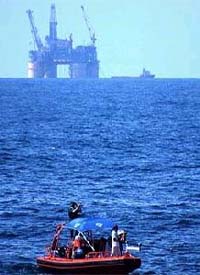 |


|
|
Bush Proposes Drilling |
|
By Cat Lazaroff Environmental News Service
Interior Secretary Gale Norton on Monday proposed the new leases in a portion of the Outer Continental Shelf in the eastern Gulf of Mexico. The lease area, also known as Sale 181, was first proposed by Interior Secretary Bruce Babbitt and President Bill Clinton after negotiations with former Florida Governor Lawton Chiles and other coastal governors in 1997. The original Sale 181 area would have covered 5.9 million acres, and come close to sensitive areas of Florida's coastline. Governor Jeb Bush has strongly opposed any new oil and gas drilling off Florida's coasts, saying the threat of damaging oil spills and other environmental disasters far outweighs the potential revenue the leases could bring. The revised Sale 181 is intended to allay those fears, while advancing President Bush's energy plan with its emphasis on increased domestic production of fossil fuels. "We have listened and worked carefully with officials and affected citizens around the 181 lease area. The outcome is a balanced and common sense proposal," said Secretary Norton. "Our modified 181 area has been adjusted from 5.9 million acres to 1.5 million. The adjusted area is at least 100 miles from any portion of the Florida coast. For example, its northern border is more than 100 miles from Pensacola, Florida and the eastern edge is 285 miles from the shores of Tampa Bay." The Energy Department projects that the revised Sale 181 could contain as much as 1.25 trillion cubic feet of natural gas and 185 million barrels of crude oil.
"Any lease sales that do occur in the 181 area will occur off the coast of Alabama, not Florida," he told the paper. "Floridians have spoken loud and clear, and their voices have been heard by President Bush." But environmental groups say the environmental problems posed by fossil fuel exploration and use - ranging from oil spills to the release of greenhouse gases - cost far more than the funds raised by the federal leases. A report released in February by the Natural Resources Defense Council (NRDC), "A Responsible Energy Policy for the 21st Century" found that offshore oil and gas drilling spilled three million gallons of oil between 1980 and 1999. Offshore pipelines have destroyed hundreds of acres of coastal wetlands, notes the report, which is based in part on data from the federal Minerals Management Service (MMS). Drilling operations generate an average of 180,000 gallons of waste muds and drill cuttings per well, says the report, which is available at: http://www.nrdc.org/. Drilling also produces air pollution. According to the MMS, drilling an average exploration well generates some 50 tons of nitrogen oxides, 13 tons of carbon monoxide, six tons of sulfur dioxide, and five tons of volatile organic hydrocarbons. More pollutants are produced when the oil and gas are burned by vehicles and power plants. "Although the new plan shrinks the size of the area the administration originally wanted to offer for lease, any drilling in the area threatens the state's coastline and its tourism based economy," said Lisa Speer, a senior policy analyst at the NRDC. "In any case, drilling off the coast of Florida is unnecessary. Most of our available offshore oil and gas is in the western and central Gulf of Mexico, and those areas are already open to leasing." "Opening a new 1.5 million acre swath of the Eastern Gulf to oil drilling unnecessarily threatens marine life with pollution and puts Florida beaches at a much greater risk for spills," agreed Environmental Defense marine conservation advocate Richard Charter. The U.S. House of Representatives voted last month to bar all new oil and natural gas drilling off the Florida coast, Charter noted. If Congress does not block the proposed area 181 leases, they could be issued to companies in December. "Given the environmental risks and the bipartisan opposition from Congress, going ahead with new drilling, even in a smaller area than originally proposed, seems like an ill considered move by the Bush administration," added Charter. This week, the House voted to block completion of a natural gas pipeline spanning the Gulf of Mexico from Alabama to Tampa, Florida. About $800 million has already been spent on the Gulfstream Natural Gas Pipeline, which is scheduled to open in 2002. Some Representatives said the vote, which bars federal approval for the project, was a reprisal against the lawmakers who supported a ban on new drilling off Florida's coast. "If you don't want to drill it, then you shouldn't consume it," said Representative Sonny Callahan, a Louisiana Republican who voted to block the pipeline. The Bush administration is expected to announce shortly a decision about whether to permit offshore production platforms to be constructed by Chevron on active offshore leases on Destin Dome, adjacent to the white sand beaches of the Florida Panhandle. |

© 1997-2002 BEI
 WASHINGTON, DC, - The Bush administration has announced it will open a previously untouched 1.5 million acre span of the Gulf of Mexico to oil and natural gas drilling - the first new leases offered in more than a decade. The new energy exploration was tailored to avoid Florida waters, heading off conflicts between President George W. Bush and his brother, Florida Governor Jeb Bush.
WASHINGTON, DC, - The Bush administration has announced it will open a previously untouched 1.5 million acre span of the Gulf of Mexico to oil and natural gas drilling - the first new leases offered in more than a decade. The new energy exploration was tailored to avoid Florida waters, heading off conflicts between President George W. Bush and his brother, Florida Governor Jeb Bush.
 Secretary of Interior Gale Norton: Supports drilling off the coast of Florida
Secretary of Interior Gale Norton: Supports drilling off the coast of Florida